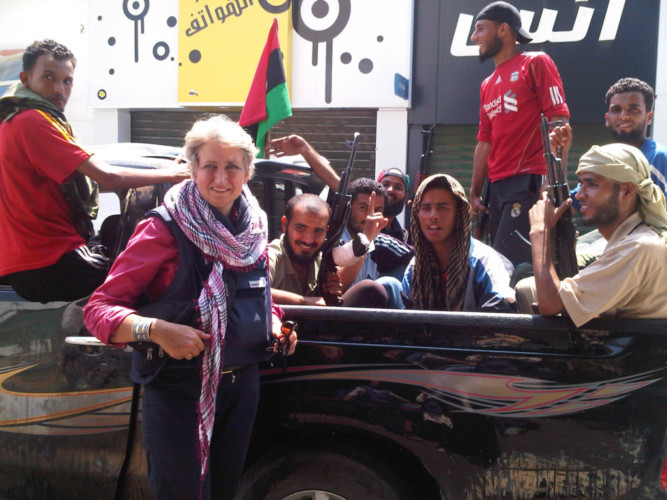From Iraq to Afghanistan, and Kosovo to the Israeli-Palestinian conflict, Lindsey Hilsum has covered most of the major world conflicts of the last two decades.
During the 2004 assault on Falluja, she was embedded with a frontline marine unit, and in 1994, was the only English-speaking foreign correspondent in Rwanda when the brutal genocide started.
But in recent months she has received more abuse on Twitter while covering the refugee and migrant crisis of Syrians to Europe than any other story she’s reported.
It’s made her wonder about the potency of certain “myths and fears” that anger and worry a lot of people, and has inspired her to “clear up some confusion” about refugees through her work.
As a journalist she feels strongly that it is her role to “humanise” conflict.
But she is also very conscious how the media can be used for propaganda purposes.
The shocking potency of this hit home a few weeks ago when notorious terrorist ‘Jihadi John’, the Islamic State militant who brutally murdered Perth man David Haines a year ago, was touted to her by a group of refugees as something of a celebrity.
She told The Courier: “I was on the border between Turkey and Syria on the Turkish side a couple of months ago where there had been an influx of refugees from an area where Islamic State had been fighting the Kurds, and I met these people who had lived under Islamic State for about a year.
“The women I talked to hated Islamic State. Some of the men were more enthusiastic about them. I asked them if they’d come across any foreigners, and they said ‘Jihadi John came to our town’. I said, ‘how did you know it was him?’ They said ‘because he wore the same outfit as in the videos’.
“The phrase Jihadi John was invented by the British tabloids. But these young men, speaking Arabic, used that phrase, which shows you just how the globalisation of vocabulary has gone. It was just awful that he has become a celebrity.”
Before becoming a journalist, Lindsey was an aid worker, first in Latin America and then in Africa.
She was shocked when David Haines, himself an aid worker, became one of a string of hostages beheaded by IS.
There was a time when aid workers and journalists would happily travel into the interior of Syria. But outside of the capital Damascus, much of the country was now a media “black hole”.
She added: “I would not cross into where David Haines went. It’s far too dangerous now. The risk of kidnap is too high. They wouldn’t think twice about slitting our throats. It’s beyond my risk threshold.”
Lindsey said some the bravest souls were the “citizen journalists” now operating covertly from within Islamic State-controlled Raqqa which, until 2013, was one of Syria’s most liberal cities.
She is in regular contact with a group of ordinary people within the city called ‘Raqqa are being slaughtered silently’. They release daily news snippets in the face of potential death.
In recent weeks Lindsey has travelled with thousands of refugees on their trail up through Greece and Macedonia, Serbia, and Hungary. Around 80% are Syrians. Most are fleeing the same people who killed David Haines. Most are journeys of necessity and desperation.
“You don’t have to be poor to fear Islamic State or President Bahsar al Assad’s barrel bombs. Even rich people flee war,”she said.
With more than 2000 separate rebel groups in Syria, she said many non-Islamic State rebels were in despair, increasingly “crushed between the hammer of one and the anvil of the other”.
Significantly, many of those now on the move are educated, English speaking Syrian middle classes. For them it had become a crisis of education. After spending years displaced in Lebanon and Turkey, many had now realised they couldn’t return to Syria and believed the best chance for their children was to get educated in Europe.
Lindsey welcomed former Prime Minister Gordon Brown’s suggestion that Lebanese teachers could be paid double to teach Lebanese children in the mornings and Syrian children in the afternoons.
It won’t end the war, but might encourage more people to stay in the region.
She believes all countries have a responsibility to take refugees. Europe had 20 million refugees at the end of the Second World War and coped.
But this wasn’t just about Syrians. Other migrants are travelling from wars and poverty in Iraq, Afghanistan and West Africa in search of a better life. The deserts of North Africa were now reputedly littered with the bones of those who have not even made it as far as the Mediterranean. But this would not prevent more desperate souls from trying.
She feared the situation will get worse before it gets better. She didn’t see how any Syrian could be expected to return. But others, inevitably, would be forced to go home, and that could prove controversial.
